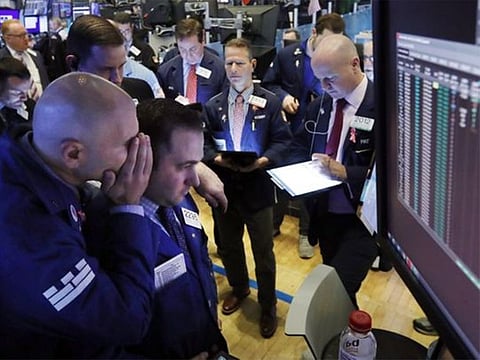Doomy market view fades, but signs of a slower rebound stays
Stocks may have gained too much too soon after March crash as current rally loses steam

Dubai: Stocks worldwide may not stay disconnected from reality any longer as a blurry and doomy view of markets was seen refocusing to one that is clearer and hopeful of an - albeit slower - recovery.
“With monetary policy likely to remain loose for a long time and the world’s largest economies gradually re-opening, our view remains that equity markets will continue to make ground over the coming years,” opined Simona Gambarini, markets economist at Capital Economics.
But that won’t be before markets deflate itself from a record much-too-quick rebound seen over the past few weeks. And stocks have already begun losing some of that unrealistic momentum this past week.
When Tesla CEO Elon Musk tweeted “lol” one morning this week – a reference he clarified to apply to “stonks”, the colloquial term given to the rallying stock market – he was calling to attention a general view that had set in among several market spectators this last month or so.
Markets have been rallying despite a series of setbacks on the pandemic front, which forced some critics to warn earlier that the current rally didn’t have the potential to last long. The others however argued markets generally traded in anticipation of an immediate future event - being short-term recovery in this case.
How trustworthy are markets at this point?
“(The rally) naturally raises a multi-trillion dollar question: should we start to get a little less constructive about risk assets’ dynamics altogether?” questioned Stéphane Barbier de la Serre, macro strategist at Makor Capital Markets. “Tricky question indeed or, at the very least trickier than it seems.”
“Indeed, in first analysis, we do understand the temptation to take profits – or at least start to fade out exposure a bit – on risk assets (like copper, oil, the volatility index VIX and the Nasdaq) - we sure do,” Barbier de la Serre added.
“In second analysis though, our strong risk-on bias recently has been rooted a lot more into an analysis of risk/reward dynamics than mere numerical targets.
“In other words, while the attainment of short term technical or psychological targets obviously justifies a bit more cautiousness looking forward, it should be borne in mind that, more fundamentally, if the same causes produce the same effects, then it is probably still too early to turn outright bearish.”
Markets get whipsawed after rallying for weeks
And just like how some critics earlier called it, stock markets around the world recorded steep selloffs in the past few days as investors reined in their optimism, particularly after the US Federal Reserve poured cold water on their hopes that the world’s largest economy would recover quickly.
US jobless data had confirmed that the economy remains under severe pressure from the coronavirus - even if the absolute worst of the crisis appears to have abated. Stocks fell massively after the news - as much as 6-7 per cent - but as fear of missing out is a powerful motivator to buy stocks, markets clawed back bit of those losses.
All three major Wall Street indexes gained on Friday, after recording their worst day since March 16, the height of the coronavirus selloff, on Thursday. For the Nasdaq, the drastic collapse came after three straight days of all-time closing highs, but the massive Thursday drop should keep stocks under pressure for a while.
The Fed left interest rates unchanged and near zero as the central bank projected a slow economic recovery from the pandemic-induced recession. In their first economic projections this year, Fed officials indicated that they expected the unemployment rate to remain elevated for years.
Nearly 20 million jobs have been lost on net since February, but the Fed chair, Jerome H. Powell, noted that the figure probably understates the extent of unemployment.
Long slog to pre-pandemic economic recovery
The latest government forecasts predict a much slower path back to economic strength than perhaps the stock market seems to expect as the economy climbs out of a virus-spurred downturn.
68.4 per cent of economists now expect US recovery in the third quarter, while the remaining few said it already started in the second quarter – a Wall Street Journal survey showed.
Most analysts chimed in how the latest projections highlighted what a long slog the recovery will be for the top economy – which in turn drags out the timeline for an economic recovery globally.
With fears of a second wave of infections and a prolonged economic recession still evident – albeit dormant, the question remains for how long economies will remain under pressure.
Sign up for the Daily Briefing
Get the latest news and updates straight to your inbox







